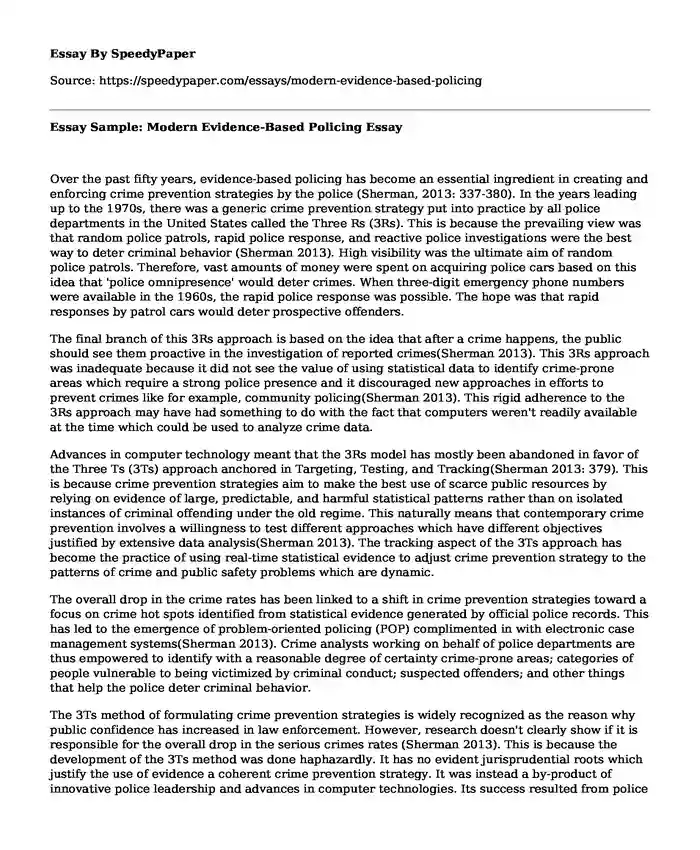
| Type of paper: | Research paper |
| Categories: | Technology Police |
| Pages: | 3 |
| Wordcount: | 578 words |
Over the past fifty years, evidence-based policing has become an essential ingredient in creating and enforcing crime prevention strategies by the police (Sherman, 2013: 337-380). In the years leading up to the 1970s, there was a generic crime prevention strategy put into practice by all police departments in the United States called the Three Rs (3Rs). This is because the prevailing view was that random police patrols, rapid police response, and reactive police investigations were the best way to deter criminal behavior (Sherman 2013). High visibility was the ultimate aim of random police patrols. Therefore, vast amounts of money were spent on acquiring police cars based on this idea that 'police omnipresence' would deter crimes. When three-digit emergency phone numbers were available in the 1960s, the rapid police response was possible. The hope was that rapid responses by patrol cars would deter prospective offenders.
The final branch of this 3Rs approach is based on the idea that after a crime happens, the public should see them proactive in the investigation of reported crimes(Sherman 2013). This 3Rs approach was inadequate because it did not see the value of using statistical data to identify crime-prone areas which require a strong police presence and it discouraged new approaches in efforts to prevent crimes like for example, community policing(Sherman 2013). This rigid adherence to the 3Rs approach may have had something to do with the fact that computers weren't readily available at the time which could be used to analyze crime data.
Advances in computer technology meant that the 3Rs model has mostly been abandoned in favor of the Three Ts (3Ts) approach anchored in Targeting, Testing, and Tracking(Sherman 2013: 379). This is because crime prevention strategies aim to make the best use of scarce public resources by relying on evidence of large, predictable, and harmful statistical patterns rather than on isolated instances of criminal offending under the old regime. This naturally means that contemporary crime prevention involves a willingness to test different approaches which have different objectives justified by extensive data analysis(Sherman 2013). The tracking aspect of the 3Ts approach has become the practice of using real-time statistical evidence to adjust crime prevention strategy to the patterns of crime and public safety problems which are dynamic.
The overall drop in the crime rates has been linked to a shift in crime prevention strategies toward a focus on crime hot spots identified from statistical evidence generated by official police records. This has led to the emergence of problem-oriented policing (POP) complimented in with electronic case management systems(Sherman 2013). Crime analysts working on behalf of police departments are thus empowered to identify with a reasonable degree of certainty crime-prone areas; categories of people vulnerable to being victimized by criminal conduct; suspected offenders; and other things that help the police deter criminal behavior.
The 3Ts method of formulating crime prevention strategies is widely recognized as the reason why public confidence has increased in law enforcement. However, research doesn't clearly show if it is responsible for the overall drop in the serious crimes rates (Sherman 2013). This is because the development of the 3Ts method was done haphazardly. It has no evident jurisprudential roots which justify the use of evidence a coherent crime prevention strategy. It was instead a by-product of innovative police leadership and advances in computer technologies. Its success resulted from police reform initiatives and new research in criminology.
Reference
Sherman, LW(2013). The Rise of Evidence-Based Policing: Targeting, Testing, and Tracking. Crime and Justice Vol 42, pp 377-451.
Cite this page
Essay Sample: Modern Evidence-Based Policing. (2022, Nov 07). Retrieved from https://speedypaper.net/essays/modern-evidence-based-policing
Request Removal
If you are the original author of this essay and no longer wish to have it published on the SpeedyPaper website, please click below to request its removal:
- My Main Characteristic - Psychology Essay Sample
- Free Essay that Includes Reasons for Participating in Activities Alone
- Essay Example on Political Powers of Alexander and Sanballat
- Language Diversity
- Essay Sample on the Nature of the Human Race
- Paper Example. Henry Roberto Cuellar
- Paper Example on Comparison of Two Cases of Fraud in Companies
Popular categories




